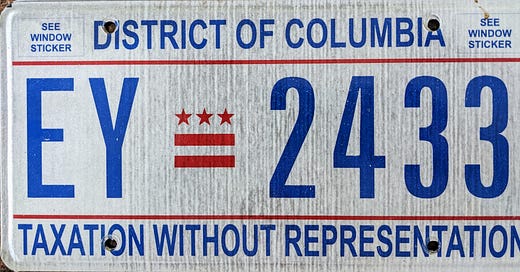Washington DC as a Hometown
Everyone hates "DC"—the symbol of political paralysis. Here are some reasons to love and learn from DC—the place where actual people live.
From one of our household’s previous cars, a license plate that expresses the “Don’t Tread on Me!” spirit of the nation’s capital.
When we began traveling for Our Towns about 10 years ago, the model we had in mind came from our previous years of living in China, where we would often head to the countryside to see real life in the villages and small towns. We learned so much about China from those journeys.
After this past decade’s travel around the US, town by town and small town by small town, we also learned about our own country in a way we had not experienced before. It was nearly embarrassing to find so much that was novel and surprising to us in our own country.
Now, having spent most of the three pandemic years in our hometown, Washington DC, we are paying closer attention to where we’ve lived for decades.
Everyone has an impression of DC. For starters, everyone loves to hate the symbolic Washington referred to as “The Beltway.” This is DC as proxy for institutional paralysis, partisanship, and vitriol. Meanwhile, in their roles as visitors and tourists, the same “everyone” loves DC for its natural beauty, impressive landmarks, museums, and events. Residents love it for its everyday international presence, its livability and scale, and its attitude, like the DC license plates with their cheeky “TAXATION WITHOUT REPRESENTATION” slogan. (Since 2017, the word END has been added to the beginning of the slogan. A positive approach!)
DC also has the problems and challenges of every other big city: school and housing issues, NIMBY squabbles, traffic, food deserts, rats, urban violence and danger—the list is familiar. DC is complicated. Like our country as a whole.
But there are some things we love about our hometown that you might not know about. Here are just a few that speak to environment and sustainability, and some of the ways that DC stands up as a model of progressive activity and makes it easy to become a responsible citizen.
Things DC has done that other communities might learn from.
Here are just a few recent developments:
Curbside composting.
Beginning this summer, DC is launching a city-wide, year-long pilot program to collect food waste, alongside trash and recycling, at 12,000 households. Fifteen hundred households from each of the eight wards across the city will participate. The first-come first-served sign-ups began at 9 AM on Earth Day.
Having had a lot of experience with similar sign-ups for the coveted time slots at our public neighborhood indoor pool during covid, I (Deb) was prepared– and completed the application by 9:05 AM. Choose me! Please choose me! Stay tuned for updates.
Gas-power leaf blowers, be gone!
A video explaining the logic behind DC’s phase-out of gas-powered leaf blowers. (Courtesy of the civic group Quiet Clean DC.)
For well over a year, DC has been living—and thriving—with a District-wide ban on the use or sale of gas-powered leaf blowers. The law passed the city council unanimously back in the summer of 2018, with a 3-year phase-in program that included lots of incentives for operators to switch machinery. (Some details here.) It took effect on January 1 of last year.
Critically, the enforcement plan has worked impressively, and also encourages citizens’ help. DC has become a model for what many have now come to expect as the blessed peace and quiet–and the public health benefits especially to lawn crew workers, who are no longer exposed to the gas blowers’ toxic emissions and damaging noise.
Citywide tree-planting.
DC has an extensive tree-planting program, boasting 12,000 new trees planted in 2022. A few of the recent upgrades include an impressive Urban Forestry Hub, powered by Our Towns colleagues from Esri, the geo-spatial mapping company, and including information in 13 different languages, a history of arbor programs, the origin story of the decades-old non profit agency behind the efforts, volunteer opportunities, forms to request services, and an interactive map that has been particularly fun during this season of spring blossoms to locate “cherry trees near me”. In fairness, DC is not doing nearly as well in its program for preserving its heritage trees.
De-cluttering, in sortable ways.
Bulk trash pickup with online scheduling, neighborhood e-cycling as a city-wide Earth Day special, frequent mailers on how to sort recyclables. Attention junk mailers: please stop with the flimsy, transparent address windows, which involves separating the non-recyclable plastic from the recyclable envelopes.
Human sustainability during the pandemic.
DC provided free PCR and at-home rapid antigen tests kits to residents, which were coordinated for safe-place pick-up and outdoor containers for PCR test drop-offs at public libraries, and an online system to deliver results. The program only recently ended, as the federal public-health emergency declaration expires, and as local infection and Covid hospitalization levels have dropped to the lowest level in two years.
And from the other 50 states (which have representatives in Congress) ….
Great Falls, South Carolina, is creating a new identity with nature-based tourism. (Photo by Steven C. Price Photography)
Our Towns brings a few new stories from South Carolina. One describes an example of creative tourism initiatives based on the natural bounty of the region, which we have seen across the country as a model for economic development.
Another is about a local community foundation, an example of community institutions that Our Towns previously applauded for their intimate knowledge and commitment to the needs of their communities.
And finally, here’s a retrospective with Andrew McKeever from Great Northshire Access Television in Vermont.
Thanks for being here.
Deb & Jim Fallows
Co-founders, Our Towns Civic Foundation






